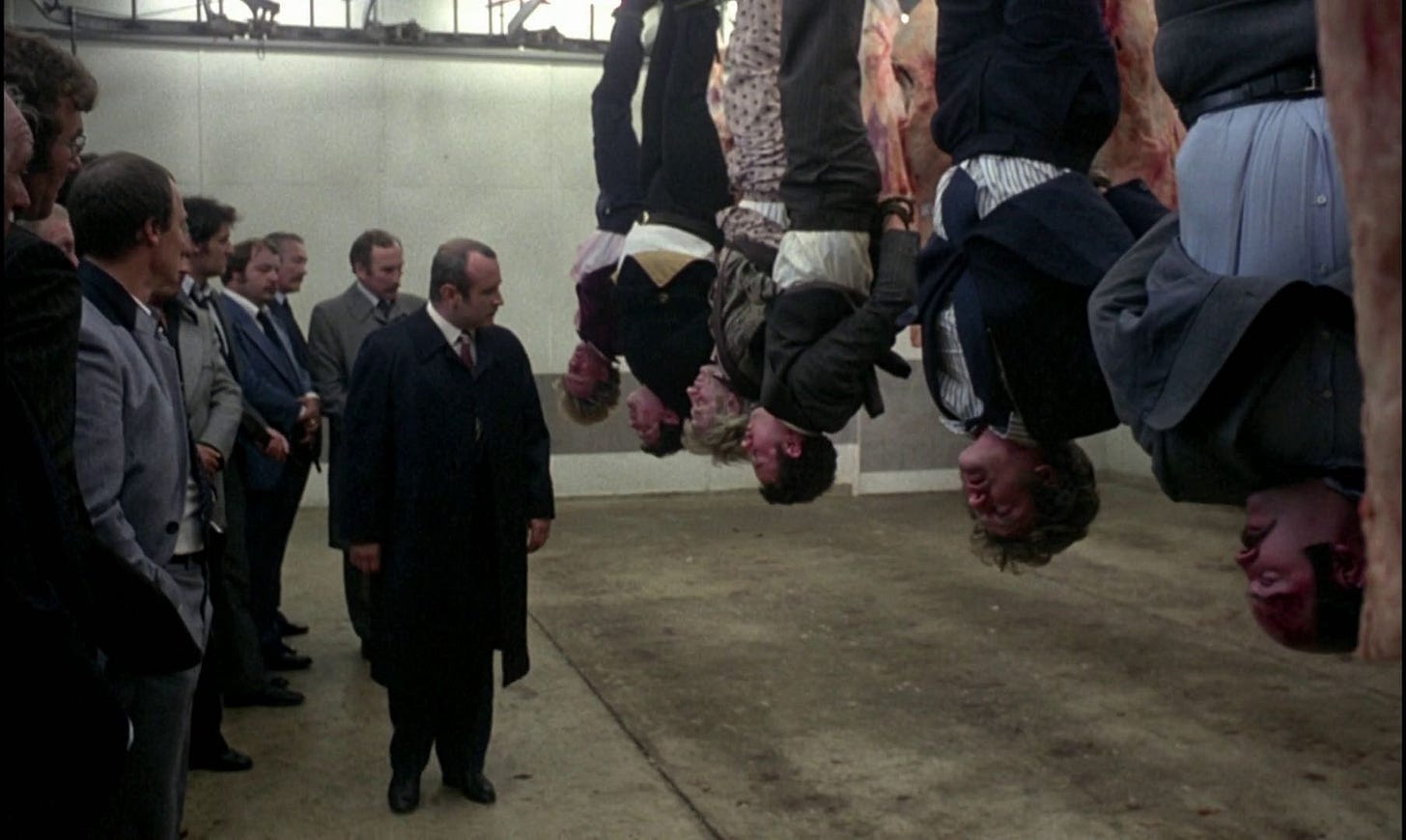The Long Good Friday (1980)

Movie rating: 7/10
Ranking high on lists of the greatest British films and starring Bob Hoskins in what is considered his breakthrough role, The Long Good Friday (currently streaming on the Criterion Channel) is a product of its time, and all the better for it.
The story of London gangster Harold Shand (Hoskins), whose “corporation” is targeted in a series of bomb attacks and assassinations while trying to seal a partnership with an American Mafia boss, the film is infused with the concerns of Britain in the late 1970s. These include the Troubles in Northern Ireland and the conflict with the Provisional Irish Republican Army (IRA); the energy crisis, growing immigration, racism, corruption involving state officials, Britain’s declining global influence, and its efforts to strengthen links with the United States and European Common Market.
Also a lot of sideburns, bell bottoms, synth music on the soundtrack, and a fresh-faced Pierce Brosnan in his movie debut as “First Irishman”.
Watching this film, directed by John Mackenzie, is a bit like peeling an onion. There’s a lot going on at the beginning and only gradually does the script by Barrie Keeffe make it clear who these characters are and what’s really happening. At the centre of it all is Shand, whose full criminality and ruthlessness take a while to fully reveal themselves to the viewer. For much of the first act, Shand is entertaining guests on his boat, striving to become a “legitimate businessman”, and making lofty, slightly delusional speeches about Britain’s glorious potential:
Our country's not an island any more. This is the decade in which London will become Europe's capital, having cleared away the outdated. We've got mile after mile or acre after acre of land for our future prosperity. No other city in the world has got, right at its centre, such an opportunity for profitable progress.
The Long Good Friday was completed in 1979, the same year Margaret Thatcher became prime minister of the U.K. Shand’s speech could be the perspective of the triumphant Conservatives, looking to “clear away” Britain’s “outdated” working class strongholds and crush organized labour to maximize profits for the City of London. The 1980s saw financialization and deregulation of the economy in all the advanced capitalist countries, bolstered by major working class defeats like the crushing of the 1984-5 British miners’ strike. Like Harold Shand, the British ruling class was perfectly happy to deploy the most ruthless violence against its enemies (or in Shand’s case, perceived enemies). The line between “legitimate businessman” and gangsters is less clear-cut than films like The Long Good Friday might have us believe.
Hoskins is fantastic as Shand. He slowly amps up the degree of menace. Once Shand and his henchmen begin trying to identify those targeting them by threatening informants, low-level criminals, and cops on the gangsters’ payroll, Hoskins shows how terrifying his character really is. When his henchmen string some upside down on meathooks to be questioned and potentially tortured and killed, the camera adopts the perspective of those at Shand’s mercy, conveying their feeling of utter helplessness.
Helen Mirren co-stars as Shand’s girlfriend Victoria, while Derek Thompson plays his right-hand man Jeff. Suspicions about who might be behind the bombings and murders, along with early scenes that go unexplained for much of the film, lead us to wonder if the source of the attacks might be either of these two people closest to the crime boss. The resolution turns out to be less predictable than I expected, anchored by a prolonged closeup of Hoskins in which his expression transforms from shock, to anger, to grim acceptance.
There’s some great, funny dialogue in this movie, though it can be hard to understand at times due to the accents and slang. Hoskins gets most of the best lines, often barbed with social commentary. “The Yanks love snobbery,” Shand says at one point. “They really feel like they’ve arrived in England if the upper class treats ‘em like shit.” Another favourite: “You don’t crucify people! Not on Good Friday!”
Despite Shand’s capacity for violence and cruelty, the character is far from a one-dimensional gangster. We see him express remorse after committing acts of violence against people close to him—a microcosm for his return to murderous gang warfare after attempting to go “straight”. At one point he slaps Victoria, then expresses immediate regret:
Harold: What's happening to me? I'm sorry. For 10 years there's been calm, no trouble. Now this.
[Victoria starts crying]
Harold: Listen, I wouldn't hurt you for the world.
Victoria: I'm so scared, Harold. I don't want to die. Don't let them kill us.
Harold: [comforting her] You won't die. It's alright. It'll be alright.
While it’s got a good screenplay and great performances by Hoskins and Mirren, I’m not sure if I would rate the film as highly as some critics have. The plot can be confusing at times, with many different characters to keep track of. Perhaps there have just been so many great crime/gangster films in the decades since. It doesn’t quite rate as high as the like of Goodfellas for me. The film doesn’t hit its stride until Hoskins goes full crime boss, but when he does he lights up the screen.



